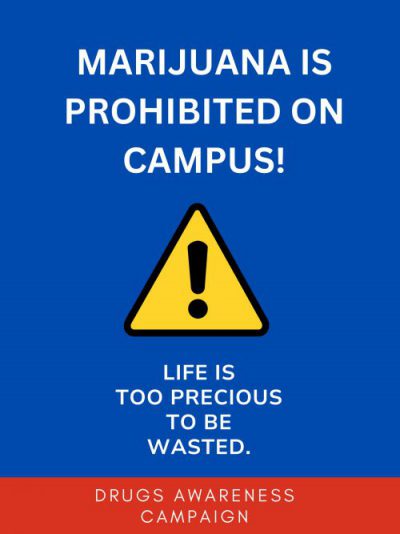Residence Life|Courtesy
Residence Life dispensed flyers across residence halls to respond to the increased presence of marijuana on campus.
As of July 1, 2021, the use and possession of marijuana by individuals 21 years of age and older is legal in the state of Virginia. However, according to the VWU Student Handbook, “Virginia Wesleyan receives federal funding through student financial aid, and therefore must uphold all federal guidelines and laws.” Due to this, the use and possession of marijuana by anyone, regardless of age, is prohibited on VWU’s campus.
“We have standards. We have standards of Student Conduct. We have community standards. We distribute those to everyone,” Jason Seward, associate vice president for Campus Life and Operational Management said.
“All students actually accept the terms of the Student Handbook, which these are clearly outlined in,” Seward said.
On Sept. 3, the Office of Residence Life distributed an email reminding students that marijuana on campus is prohibited. The email said, “So far this semester we have already had 4 incidents involving marijuana on campus.”
Elyse Rosen, Director of Residence Life, added that, “The intention with using this specific number at that time was because, while laws and regulations have relaxed throughout the state and everything, we have seen an increase already coming into the third week of reported incidents.” Rosen said.
Rosen explained that even off campus, marijuana should not be possessed or used by anyone under the legal age. “Students under 21 shouldn’t be smoking, drinking … because you have to be 21 in order to possess any marijuana or alcohol,” she said.
“Your body is a container,” Seward said. He elaborated that the use of marijuana off campus does not exempt students from repercussions. “If students choose to engage in activity off campus and then come back to campus, if … a cause for university awareness or response [is created], then the university has a duty to respond,” Seward said.
Seward emphasized that if the university is made aware of a situation, it has the duty to step in. “All the incidents that we respond to are brought to our attention, either through someone intercepting, or someone reporting through the LiveSafe app, or someone just blatantly calling Security or Residence Life,” he said.
“We’re not going around hiding in cars and waiting for people to start lighting up or hear bottles clinking,” Seward said.
In response to finding students in possession or use of marijuana, Rosen outlined the university’s actions. “Myself, our assistant director, and then our two village coordinators will conduct related meetings with students of concern or who were engaging in policy violations,” Rosen said.
Rosen explained that if a student were to be found smoking on campus or in possession of paraphernalia in their room, the next step would include conduct probation. “Conduct probation, which is our first level of probation, just kind of a warning that should they be involved in any policy violations during that time it would be … subject to further disciplinary action,” Rosen said.
Additionally, Rosen said, “We notify parents and or coaches if they’re members of the student athletic group and population because they also have their own expectations and requirements.”
In regards to supporting students, “… we also have drug education courses, so students who are found in possession or in use of illicit substances such as marijuana would be subject to complete a drug education course online,” Rosen said. “It does come with that fine associated to complete it.”
Rosen added that the intention of the course is to avoid further incidents. “[It is] just like drug probation to make sure that that behavior is not continuing and they understand the safety and risks associated with such activity,” Rosen said.
“We want students to be supported,” Seward said. “They may be in a difficult time and they’re turning to drugs and alcohol to manage those stressors.”
When students need help, Rosen described that there are a variety of resources. “There are layers of support and different levels for who they can go to and who they can see to kind of get that assistance,” she said.
“Ultimately, we don’t want this behavior, this choice, to kind of snowball and become more of a pattern than a mistake or a negative choice that occurred,” Rosen said.
“The real judge of character for a person is how you move forward from that moment, how you move forward from the adversity you face, or a time where you made a mistake,” Seward said.
Seward shed light on the consequence to the institution and all students at Virginia Wesleyan if federal laws are not followed. “Imagine no federal financial aid for you to attend college here,” he said. “If we were to choose not to follow those guidelines, then we would lose federal funding, and that doesn’t benefit the students at all.”
“Even though it’s legal in the state of Virginia, it is still illegal at the federal level,” Seward said. As a federally funded institution, VWU is required to adhere to federal law, rather than state law.
By: Isaac Fick
